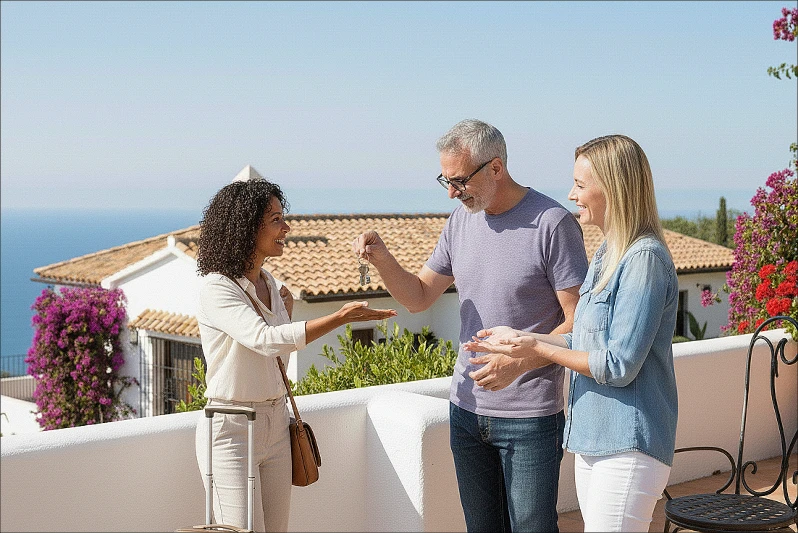Understanding Non-Resident Property Taxes for Joint Owners in Spain: A Comprehensive Guide
July 17, 2023

Owning a property in Spain together, whether with your spouse, a friend, or a business partner, can be a great investment or a perfect holiday home. But joint ownership also comes with specific tax obligations, especially if you are non-residents. Understanding how Modelo 210 works, how income and expenses are split, and how to avoid common mistakes is essential to stay compliant and avoid penalties.
This guide explains everything you need to know about non-resident property tax in Spain for joint owners.
Clarify Ownership Shares Early
When a property in Spain is owned by more than one person, it’s essential to establish the ownership shares clearly from the beginning. These shares determine each co-owner’s rights, responsibilities, and, most importantly, their share of the property income, expenses, and tax liability.
The declared percentages must always match the ownership percentages stated in the title deed (escritura), the legal document signed before a notary at the time of purchase. This deed is then registered with the Spanish Land Registry (Registro de la Propiedad), which officially records each owner’s share. The same ownership percentages are later used when filing your Modelo 210 tax returns.
Individual Tax Returns
In Spain, joint owners are required to file their tax returns separately. Each co-owner must report their share of the property and any associated income, or expenses on their individual tax return.
For instance, if a married couple owns two apartments that are rented out for the entire calendar year, they will have to file a total of 4tax returns, 2 tax returns per property. However, it’s important to note that the tax is filed separately, meaning that they won’t pay tax twice, as it’s split according to each person’s percentage of ownership.
Each Owner Must File Their Own Tax Return
In Spain, joint owners cannot file a single tax return. Each co-owner must submit their own Modelo 210 based on their share of ownership and their portion of any income and expenses.
For example, if two people each own 50% of a property, they must each submit a separate return covering 50% of the income and 50% of the deductible expenses.
Example: If a married couple owns two rental apartments 50/50, they will now file 4 annual Modelo 210 returns (one per owner and per property).
Coordinate with Co-Owners to Avoid Mistakes
Communication is key when filing taxes jointly. All co-owners must declare the same income and expense figures according to their ownership shares. If one co-owner declares a different rental income or deductible expense amount, the Spanish tax office may detect a discrepancy and request clarification or impose penalties.
It’s a good idea to agree on the income and expenses to be declared before submitting your returns to ensure consistency and compliance.
Non-Resident Tax Obligations in Spain
Being a non-resident doesn’t exempt you from Spanish property tax obligations. As a joint owner, you must submit the Modelo 210 tax return and pay tax on your respective share of the property.
The applicable tax rates are:
- 19% for tax residents of the EU, EEA (including Norway, Iceland and Liechtenstein)
- 24% for non-EU/EEA tax residents
Imputed Income vs. Rental Income
- Imputed income: If the property is not rented, tax is calculated on a notional rental value. The taxable base is the cadastral value × imputed percentage (usually 1.1% or 2%).
- Rental income: If the property is rented, the taxable base is the rental income minus deductible expenses (for eligible taxpayers).
Non-EU/EEA tax residents must pay tax on the gross rental income, as they cannot deduct expenses.
Deductible Expenses for Joint Owners
If you are an EU/EEA tax resident, you may deduct certain expenses related to the rental of your property. These can include:
- Local property taxes (IBI) and rubbish collection fees (Basura)
- Utilities (water, gas, electricity)
- Community fees
- Insurance premiums
- Property management or administration services
- Legal and accounting costs
- Costs of drafting rental contracts or defending legal claims
It’s crucial to keep all invoices and receipts for at least four years, as the Spanish Tax Agency (Agencia Tributaria) may request proof of these deductions.
Simplify Modelo 210 Filing with IberianTax
With IberianTax, filing your returns as a co-owner is simple. Our platform is the first in Spain designed for non-resident owners, and allows you to:
- Submit separate returns for up to eight co-owners per property
- Declare both imputed income and rental income
- Complete the process step by step in English, German, French, or Spanish
- Comply with regulations without the need for an expensive advisor
Our platform guides you through every detail - from ownership percentages to deductible expenses - so you can file your Modelo 210 correctly and hassle-free.